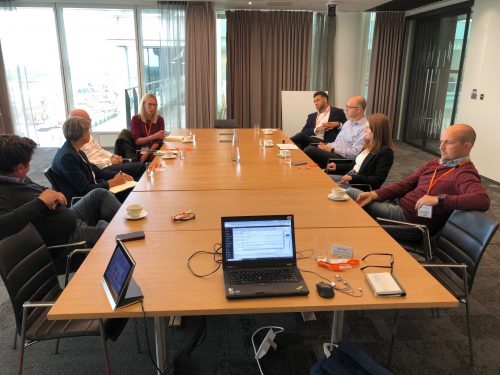Rainmakers round table report: Bags of opportunity – but fear stalks deals market


The discussion began with an overview of the deals market over the last six months – and a look forward to pipelines into 2023.
Navin Prabhakar, partner at Gowling WLG, said that the current funding picture was very much a “mixed bag”. He added: “What we’re working on is everything from revolving credit facilities through to medium-term loan programmes. We’ve go a busy pipeline until December – after that it become a little bit harder to predict.”
Jane Hartley added: “We’ve been active on transactions, but, in the last few months, they’ve taking longer to do. We put this down to a continually changing economic environment – especially from a funding point of view. We’re having lots of conversations with business owners, but many of them are nervous about pushing the button. However, there are lots of people wanting to do things.”
“There’s a lot of prep work going for transactions that will maybe launch early next year,” said Michelle Heptinstall of ThinCats. She added: “I agree with Jane that there is a lot of nervousness about pushing go, but we’ve got good visibility on the rest of year.
Tom Horton, also of ThinCats, called the current a climate a “perfect storm”, while Ant Edwards, corporate finance director at EY said that economic uncertainty is impacting valuations.
BGF’s Aaron Baker said that the amount of inbound instructions his team were receiving was getting “stronger than ever”. However, he added: “We’ve had an extremely busy year, but middle term visibility is a bit slower.
There is bags of opportunity – but lot of fear running through the market.”
“We’re busier than we’ve ever been, added Stephen Murray of YFM Equity Partners. “There are lots of opportunities – and lots of them certainly looking interesting.”
This lack of certainty about the immediate future of the deals market is in stark contrast to the Covid period, when, despite the UK economy being in deep shock, things were at least certain, said our Rainmakers.
Baker said: “Looking back, we had two or tree years of normality – now projections aren’t representative of tge business in normal state. Trying to unpick that is very tough.”
So, what are our deals professionals working on at the moment? Is it M&A, exits/MBOs/EOTs? And what are the growth or working capital challenges?
For Hartley, it was a mixture of the lot. She said: “Many businesses want to increase working capital and there are a lot of transactions that have been around since pre-summer.”
Meanwhile, she said, there are large owner-managed or PE-backed businesses that are looking to continuing acquiring vulnerable players who are struggling with inflationary pressures. She added: “There are a lot of opportunities out there at the moment – that will continue.”
Hartley said that firms looking to pay to secure funding, and added: “The funding available over next 18 months will get more expensive, but those companies looking for cash to support acquisition strategies are willing to take the pain.
“In the debt market there is no shortage of capital. We’re speaking to funders and high street banks who want to put funding out there, but there is increased level of interrogation – basically, they’re becoming more picky.
Prabhakar countered this with his view that not all lenders are out there to lend. He said: “Some clearing banks are focusing on returns over last 18 months. The cash is there, but appetite might not be in some cases.
With such a complex picture at present, do entrepreneurs understand the options open to them? Is education on this key?
Horton said that dealing with a non-advised client can be eye-opening. “Those selling who haven’t instructed an adviser – more often that not – haven’t thought about the risks involved.
“Then, of course, we have advised clients who have chosen well and spoken to other business owners. That was one of the positive things that came out of Covid; extreme collaboration and a sharing of views.”
Murray said he was advising clients to think about risk and reward, but warned: “Management teams are still stuck 6-9 months ago. That lag can be shorted is they’re well advised, however.”
Horton said that when rainmakers talked about “scarcity in the market”, what they really mean is high quality businesses.” He added: “Some businesses were experiencing problems going into Covid – well, now the bar is even higher. Are you really as good a business as you think you are? There has to be a willingness to accept downsides in your business.”
For Baker it was about answering questions that doesn’t get answered enough: “Advice really is key,” he said.
So, what advice would our crack team of advisers give to those looking for funds to buy a business?
Hartley said preparation was key: “Present a well thought-through plan and tell the story and what you want to.”
Horton added: “Start thinking: why would you buy this business and why would the sellers sell it. What makes the acquisition worthwhile?”
Join the culture club, said Baker: “Make sure you understand the culture of the business you’re buying. You need to be aligned.
Most important for Heptinstall was having strategy and knowing what end game is. She said: “What does it look like? What’s the evolution from Plan A to Plan B?”
Murray warned entrepreneurs not to rush. “I like to see someone who has mapped out a market, but don’t jump at the first opportunity; consider it in a balanced way. The culture piece takes time. Someone thinking about it properly fills me full of confidence.
Prabhakar warned: “If you’ve not been through the deals process before and you have a junior management team, the process can be a nightmare. Organisation and preparation is key.”








